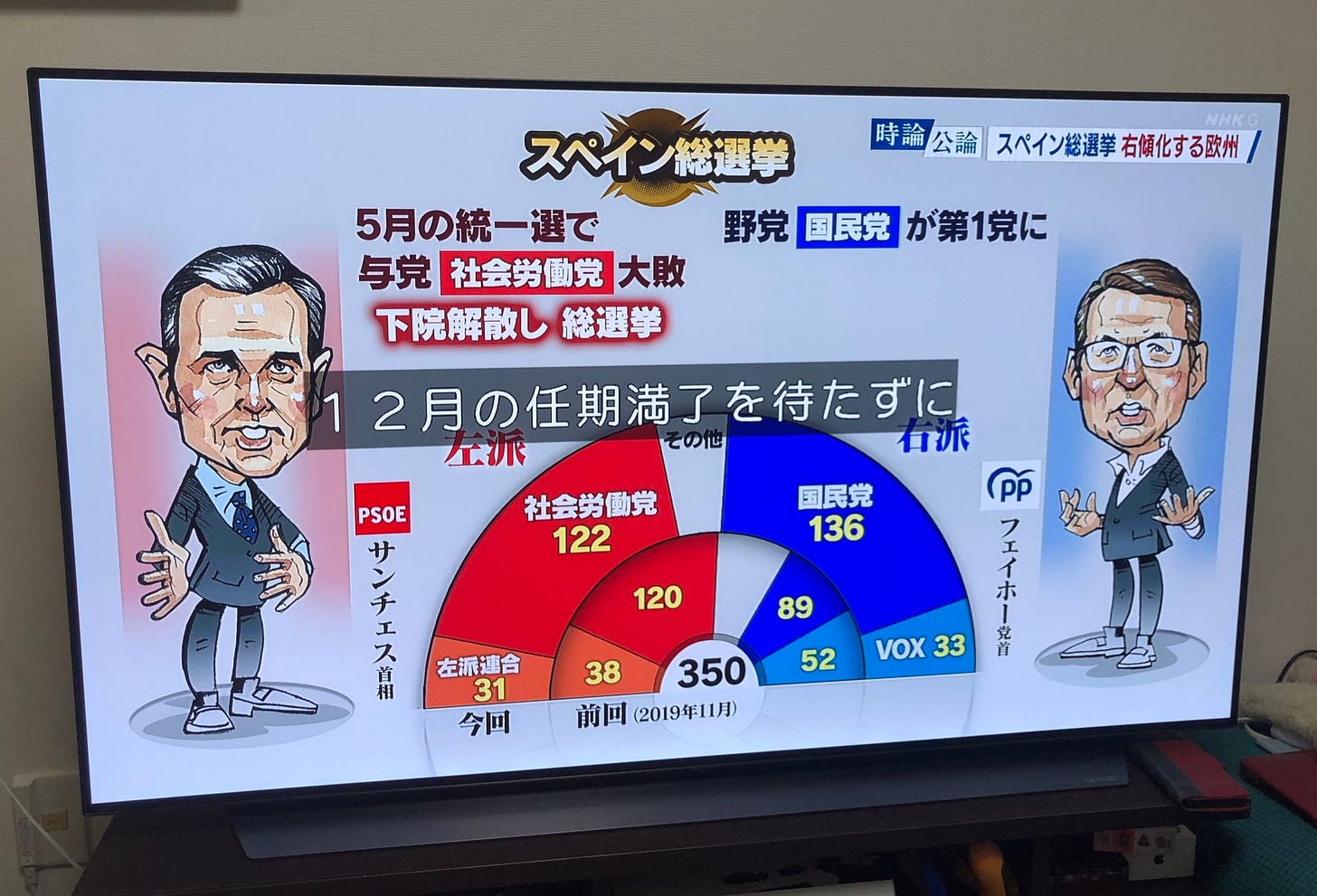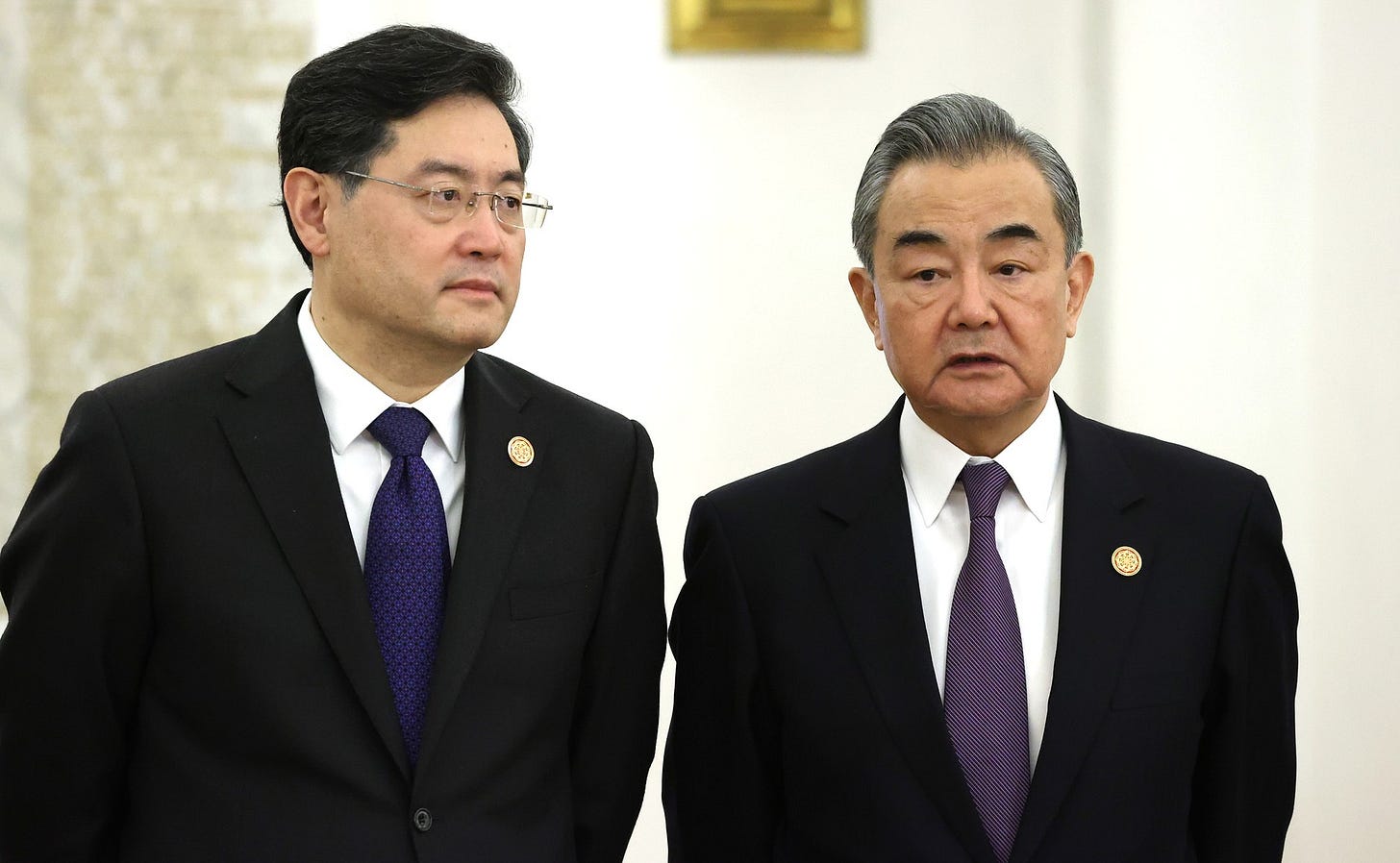Coup in Niger, China's FM out, and Sanchez in the hands of Puigdemont BoP Brief #2
Welcome to the Business of Power Brief
The coup in Niger and the end of the French sphere of influence in Africa

On July 26, soldiers in Niger claimed to have seized control of the country and detained President Mohamed Bazoum. Since 2020 West Africa has been suffering a series of military coups that are putting an end to French influence in the region.
Why Niger matters?
Bazoum is considered a Western ally. Niger hosts a US drone base and cooperates with the French army in anti-terrorist operations.
Niger is Africa's second-largest uranium producer and France’s main source of uranium. That means that the French nuclear program highly depends on Niger’s uranium.
Will the coup impact the uranium trade?
The army has to get paid too. Uranium is an essential source of wealth for the country’s budget. So it is unlikely a military government would disrupt mining operations and trade, although they may use it as leverage with France.
This is the fourth coup in the region this year.
Why is this happening?
Short answer? The usual cocktail: bad economy, bad governance, and bad security.
Long answer? Weak Frenchs and cunning Russians.
Putin has been trying to reach out to Africa for a few years now, especially since Western sanctions were enforced after the invasion of Ukraine.
While the coup in Niger was happening, Putin pledged to give free grain to Africa in the Russia-Africa summit. I talked about the importance of Russia’s wheat in last week’s Brief.
Interestingly, Bazoum was one of the African leaders who declined to meet Putin this week – although they met in Moscow in March, and Bazoum already had to deal with a coup attempt while he was there. So he might have good reasons not to leave the country.
As often happens with Russia, their economic ventures might not have been that successful in Africa.
But thanks to the presence of PMC’s Wagner – who we know are in the business of coups – Moscow has been able to help in the rise of friendly military governments in the region.
In Mali and Burkina Faso, after the army took over, they ceased their military alliance with France.
Multipolarity reaches Africa
Russia's influence is definitely an enabler of these coups. But I think that when someone gets into your backyard, it's because you didn't build a high enough fence.
France has been the hegemonic player in the region for decades, so it should be better at countering Moscow's actions.
Paris has been incapable of keeping their allies in power, and that is to a great deal due to their own weakness.
Macron has tried to up-play his game at the international level; however, his internal problems are difficult to hide anymore. Outside France, everybody sees that the golden days are over – to be honest, we have known that since De Gaulle, but don't tell them.
This is part of a broader trend of rebalancing Western global influence. Multipolarity has come to Africa. It's not only Russia or China; it is also Turkey, the Gulf countries, and even India.
Bottom line:
As the post-coup Constitution of Mali says, “French is not the official language anymore.”
The Françafrique is gone.
Qin Gang is out.
And someone else that is also gone is China’s Foreign Minister, Qin Gang.
What do we know?
China's Foreign Minister Qin Gang has been replaced after disappearing from public view. He has been replaced by the veteran Wang Yi, former FM and current member of the politburo, a move that seems to offer continuity.
Why is this weird?
Because there is no reason given and he was handpicked by Xi.
The affair has threatened to become an embarrassment for Xi, who analysts say handpicked Qin for the foreign minister role late last year, shortly after the Chinese leader was confirmed for an unprecedented third term in office. China’s state news agency Xinhua said on Tuesday that the country’s rubber-stamp parliament, the National People’s Congress, had removed Qin and replaced him with the country’s most senior diplomat, Wang Yi, his predecessor as minister. The terse statement did not give further details.
The initial reason for his disappearance was due to “health issues”. But China’s Ministry of Foreign Affairs began to erase Qin Gang’s information from its website:
Searches within the web address of China’s Ministry of Foreign Affairs (MFA) for “Qin Gang” on Wednesday returned scores of headlines from January to June, topped by “Qin Gang Meets With Russian Deputy FM Rudenko,” and “Qin Gang Holds Talks with US Secretary of State Blinken.” However, all of these official MFA news releases are now removed from the site, yielding a message that reads: “The page you are visiting does not exist or has been deleted.
So that’s not definitely because of health issues. There are, of course, many other kinds of rumors, treason, factionalism, differences with Xi, and even a mistress and a secret child involved.
Why this matters?
This is not something ordinary, we are talking here about a movement at the top level, not even a year after the party Congress.
Whether Qin Gang is the victim of factional infighting or a serious treason accusation, both scenarios don’t look good for Beijing. The way this has been handled is sloppy, at the least.
What to expect?
I don’t think that this change will have an impact on China’s foreign policy, although it may have an impact on China’s international image.
I think Qin’s ousting is important in terms of China’s elite politics. Expect more of this once the question of Xi’s succession becomes unavoidable.
I often see China watching a true crime show. You get a body, and you need to figure out what happened there.
That’s what Jordan Schenier is trying to do with Matt Brazil in this episode of China Talk, which I recommend to know more about the issue.
Spanish presidency in the hands of Catalan exiled leader.

In last week's brief, I argued that Pedro Sanchez still had a chance in the Spanish general election, and his silver medal definitely feels better than Feijóo's gold.
However, his presidency depends on Carles Puigdemont, the Catalan president exiled in Brussels for proclaiming the Catalan Republic in 2017.
Negotiations won't be easy, but I believe Puigdemont's party is more open to negotiation than their words suggest. But also Sanchez is too used to not giving concessions to Catalonia that he won’t be able to make an offer that allows Puigdemont to save face.
Everything remains open, and the cracks in the Spanish political system are still visible, as I wrote here for Unherd.
Taking a broader European and American perspective, I believe that what we see in Spain is a reflection of the aftermath of the 2010's crisis.
The fear of populist upheavals might have subsided, but none of the problems that caused them to arise have been solved.
This week’s long read, “The populist Right are fake revolutionaries”
Related to this topic, a quite timely piece about the populist right in Europe, “The populist Right are fake revolutionaries“ by Thomas Fazi in Unherd.
I am not only sharing because Fazi had the amability to quote my piece about Vox but because it is a fair assessment of what we can currently expect of the new emerging right-wing forces in Europe:
It seems inevitable that Right-populism will play an increasingly influential role in the coming years. But exactly what kind of “change” should we expect from these “patriots”? From a cultural standpoint, such parties could not be further from the liberal-progressive mainstream: they share an attachment to Europe’s traditions and religious heritage, a dislike for eurocrats and an opposition to all things woke — immigration, gender ideology, green fanaticism. So we can definitely expect a pushback on these fronts, within individual countries as well as at the European level: more relaxed climate policies, more restrictive immigration policies and less talk about gender.
On other, arguably more important issues, however, these so-called populist parties are peculiarly aligned with the mainstream. In terms of economic policy, for example, almost all of them are wedded to the neoliberal orthodoxy embedded in the EU: with few exceptions, their economic agendas revolve around pro-austerity, pro-deregulation, anti-worker and anti-welfare policies.
One doesn't need to share Thomas Fazi's position on the EU or other matters to appreciate this article. Whether you are interested in or fearful of right-wing populist revolts, Fazi's analysis allows you to move beyond the hype and hysteria often found in mass media when discussing these issues.
This is all for this week. As always, comments, likes, and shares are appreciated.
Have a great weekend!
Miquel



